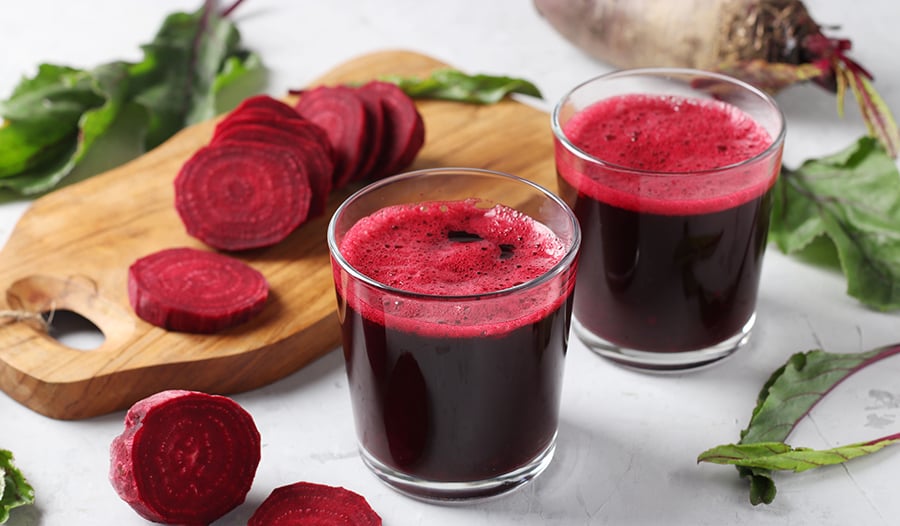Κορυφαία 10 τρόφιμα μονοξειδίου του αζώτου

Το μονοξείδιο του αζώτου είναι ένα αέριο που παράγεται φυσικά μέσα στο σώμα και δρα ως αγγειοδιασταλτικό, βοηθώντας στη βελτίωση της ροής του αίματος. Η σωστή ροή αίματος είναι απαραίτητη για τη βέλτιστη υγεία των ιστών και των οργάνων. Συγκεκριμένα τρόφιμα και συμπληρώματα μπορούν να βοηθήσουν στην ενίσχυση των φυσικών επιπέδων μονοξειδίου του αζώτου του σώματος.
Τι είναι το μονοξείδιο του αζώτου;
Το μονοξείδιο του αζώτου είναι ένα αέριο που παράγεται φυσικά στο σώμα συνδυάζοντας άζωτο και οξυγόνο. Ο κύριος ρόλος του είναι να υποστηρίζει την υγεία των αιμοφόρων αγγείων βοηθώντας στη διαστολή των αιμοφόρων αγγείων, στην αύξηση της παροχής αίματος και στη μείωση της αρτηριακής πίεσης.1
Η αγγειοδιαστολή είναι η διεύρυνση των αιμοφόρων αγγείων, η οποία επιτρέπει περισσότερο αίμα να ρέει μέσω των αγγείων. Το μονοξείδιο του αζώτου λειτουργεί χαλαρώνοντας τους εσωτερικούς μύες των αιμοφόρων αγγείων, επιτρέποντάς τους να διευρύνουν και να αυξήσουν τη ροή του αίματος. Η υγιής αγγειοδιαστολή είναι σημαντική για τη βέλτιστη υγεία, καθώς επιτρέπει στο οξυγόνο και τα θρεπτικά συστατικά να φτάσουν στους ιστούς και τα όργανα μέσα στο σώμα, υποστηρίζοντας τη λειτουργία τους.2
Ως υποστηρικτής της υγείας των αιμοφόρων αγγείων, το μονοξείδιο του αζώτου προσφέρει έναν ξενιστή οφελών σε όλο το σώμα. Μελέτες δείχνουν ότι το μονοξείδιο του αζώτου μπορεί να βοηθήσει στη μείωση του πόνου των μυών, στη θεραπεία της στυτικής δυσλειτουργίας, στην ενίσχυση της απόδοσης της άσκησης και ακόμη και στη διαχείριση του διαβήτη τύπου 2.
Ενώ το μονοξείδιο του αζώτου δεν μπορεί να βρεθεί σε συμπληρώματα ή τρόφιμα, ορισμένα συμπληρώματα και τρόφιμα υποστηρίζουν την παραγωγή μονοξειδίου του αζώτου από τον ίδιο τον οργανισμό. Η κατανάλωση μιας δίαιτας υψηλής περιεκτικότητας σε αντιοξειδωτικά μαζί με τροφές πλούσιες σε νιτρικά άλατα μπορεί να υποστηρίξει την παραγωγή μονοξειδίου του αζώτου. Δύο αμινοξέα, L-αργινίνη και L-κιτρουλίνη, τα οποία βρίσκονται σε ορισμένα τρόφιμα ή ως συμπληρώματα, υποστηρίζουν επίσης την παραγωγή μονοξειδίου του αζώτου.
Μελέτες δείχνουν ότι μια διατροφή πλούσια σε φυσικά νιτρικά άλατα μπορεί να βελτιώσει την αθλητική απόδοση και να μειώσει τον κίνδυνο χρόνιων ασθενειών και ασθενειών που σχετίζονται με τη διατροφή. Αντίθετα, η κατανάλωση μιας δίαιτας υψηλής περιεκτικότητας σε προστιθέμενα νιτρώδη ή νιτρικά άλατα μπορεί να αυξήσει τον κίνδυνο ασθένειας.
Πολλά τρόφιμα που περιέχουν φυσικά νιτρικά άλατα περιέχουν επίσης αντιοξειδωτικά όπως η βιταμίνη C, η οποία βοηθά το σώμα να παράγει μονοξείδιο του αζώτου αντί για νιτροζαμίνες. Όταν καταναλώνονται τρόφιμα με πρόσθετα νιτρικά και νιτρώδη άλατα - όπως εμπορικά επεξεργασμένα χοτ ντογκ, αλλαντικά, μπέικον και ζαμπόν -, τα νιτρικά άλατα διασπώνται σε νιτροζαμίνες. Οι νιτροζαμίνες είναι γνωστό καρκινογόνο και μπορεί να αυξήσουν τον κίνδυνο ορισμένων τύπων καρκίνου όταν καταναλώνονται συχνά.3,4 Η κατανάλωση επεξεργασμένου κρέατος έχει επίσης συσχετιστεί με διάφορους καρκίνους, συμπεριλαμβανομένων των καρκίνων του παχέος εντέρου, του μαστού, του ήπατος και του πνεύμονα, καθώς και αυξημένο κίνδυνο διαβήτη και καρδιακών παθήσεων.5—7
Για να υποστηρίξετε υγιή επίπεδα μονοξειδίου του αζώτου και να μειώσετε τα επίπεδα νιτροζαμινών, τρώτε λαχανικά που περιέχουν φυσικά νιτρικά άλατα και είναι πλούσια σε βιταμίνη C, ελαχιστοποιώντας ή εξαλείφοντας την πρόσληψη επεξεργασμένων κρεάτων.
Κορυφαία τρόφιμα για την ενίσχυση του μονοξειδίου του αζώτου
Το αέριο μονοξείδιο του αζώτου παράγεται από φυσικές πηγές νιτρικών και νιτρωδών στα τρόφιμά μας, όπως σκούρα φυλλώδη χόρτα, εσπεριδοειδή, κρέας, πουλερικά, θαλασσινά, ξηρούς καρπούς και σπόρους, σοκολάτα και κρασί. Με την κατανάλωση μιας δίαιτας πλούσιας σε νιτρικά άλατα, ένα άτομο μπορεί φυσικά να υποστηρίξει τα δικά του επίπεδα μονοξειδίου του αζώτου.
Σπανάκι
Τα φυλλώδη πράσινα λαχανικά όπως το σπανάκι, μαζί με το λάχανο, η ρόκα και το ελβετικό σέσκουλο, έχουν υψηλότερες συγκεντρώσεις νιτρικών από άλλα λαχανικά. Το σπανάκι μπορεί να καταναλωθεί φρέσκο και να καταναλωθεί ωμό σε σαλάτες, σάντουιτς ή περιτυλίγματα. Το σπανάκι είναι επίσης εξαιρετικό στον ατμό ως συνοδευτικό ή μαγειρεμένο με αυγά, σούπες, στιφάδο ή σάλτσες. Μπορείτε επίσης να χρησιμοποιήσετε σπανάκι στο ψήσιμο, προσθέτοντάς το σε μάφιν ή ψωμιά για ενίσχυση σιδήρου, ινών και νιτρικών αλάτων! Τέλος, το σπανάκι μπορεί επίσης να αγοραστεί ή να αποθηκευτεί κατεψυγμένο για ευκολία και για την πρόληψη της σπατάλης τροφίμων.
Εάν δεν παίρνετε πολύ σπανάκι στη διατροφή σας, μπορείτε ακόμα να επωφεληθείτε από τις θρεπτικές του ιδιότητες μέσω σκόνης σπανακιού ή καψουλών.
Τεύτλα
Τα τεύτλα είναι ένα πολύχρωμο ριζικό λαχανικό πλούσιο σε αντιοξειδωτικά, φυτικές ίνες και νιτρικά άλατα. Τα τεύτλα μπορούν να χυθούν ωμά για ένα πολύχρωμο, ενυδατικό ποτό ή να ζυμωθούν σε ξινολάχανο, ένα καρύκευμα υγιές για το έντερο. Τα τεύτλα μπορούν επίσης να ψηθούν σε μάφιν, ψωμιά, κέικ, τηγανίτες ή βάφλες, παρέχοντας μια ζωντανή ροζ ή κόκκινη απόχρωση στη συνταγή σας!
Τα τεύτλα συνήθως ξεφλουδίζονται και μαγειρεύονται για σούπες, σαλάτες ή συνοδευτικά πιάτα. Για όσους δεν απολαμβάνουν τη γεύση των τεύτλων, ένα συμπλήρωμα σκόνης τεύτλων είναι ένας εξαιρετικός τρόπος να επωφεληθείτε εύκολα και σταθερά από τα θρεπτικά οφέλη των τεύτλων!
Με φυσική υψηλή περιεκτικότητα σε νιτρικά άλατα που υποστηρίζουν την υγεία των αιμοφόρων αγγείων, μελέτες δείχνουν ότι τα τεύτλα και οι σκόνες τεύτλων μπορούν να υποστηρίξουν την αθλητική αντοχή και να αυξήσουν την ικανότητα ενός ατόμου να χειρίζεται άσκηση υψηλής έντασης.
Σκόρδο
Το σκόρδο έχει πολλές ισχυρές φαρμακευτικές ιδιότητες, χάρη σε μια φυσική ένωση στο σκόρδο γνωστή ως αλικίνη. Το σκόρδο είναι επίσης μια εξαιρετική πηγή νιτρικών, βοηθώντας στην αύξηση των επιπέδων μονοξειδίου του αζώτου, ακόμη και όταν καταναλώνεται σε μικρές ποσότητες! Το σκόρδο συνήθως απολαμβάνεται μαγειρεμένο και χρησιμοποιείται συχνά σε αλμυρές συνταγές, όπως σούπες, στιφάδο, σάλτσες, σάλτσες, σάλτσες σαλάτας, μαρινάδες και αλμυρές ψημένες συνταγές. Το σκόρδο μπορεί επίσης να καταναλωθεί σε μορφή σκόνης ή κάψουλας.
Τα πρόσθετα οφέλη για την υγεία του σκόρδου περιλαμβάνουν την υποστήριξη της ανοσολογικής λειτουργίας , βοηθώντας στη μείωση της αρτηριακής πίεσης και των επιπέδων χοληστερόλης, υποστηρίζοντας την αθλητική απόδοση, την υγεία του εντέρου και την υγεία των οστών και πιθανώς βοηθώντας το σώμα να αποτοξινωθεί από τα βαρέα μέταλλα.
Καρότα
Τα καρότα παρέχουν πολλά οφέλη για την υγεία, συμπεριλαμβανομένης της υποστήριξης της υγείας των ματιών, της πέψης, της υγείας της καρδιάς, της ανοσολογικής λειτουργίας, της υγείας του δέρματος και των υγιών επιπέδων χοληστερόλης. Τα καρότα είναι πλούσια σε βήτα καροτένιο, μια ένωση που δίνει στα καρότα το πορτοκαλί χρώμα τους και μετατρέπεται σε βιταμίνη Α μέσα στο σώμα.
Η βιταμίνη Α παίζει πολλούς σημαντικούς ρόλους στο σώμα, όπως η υποστήριξη της υγείας των ματιών, της ανοσολογικής υγείας, της ανάπτυξης, της ανάπτυξης και της αναπαραγωγικής υγείας. Επιπλέον τρόφιμα πλούσια σε β-καροτένιο περιλαμβάνουν πεπόνι, κολοκύθες, μάνγκο, ροδάκινα και βερίκοκα. Τα καρότα είναι επίσης ινώδη λαχανικά και πηγή νιτρικών αλάτων.
Κρέας, πουλερικά και θαλασσινά
Το κρέας, τα πουλερικά και τα θαλασσινά είναι όλες πηγές πρωτεΐνης, ένα απαραίτητο μακροθρεπτικό συστατικό για την ανάπτυξη, την υγεία των οστών, την υγεία των μυών, τη γνωστική λειτουργία και τη διαχείριση του βάρους. Το κρέας, το κοτόπουλο και τα θαλασσινά είναι επίσης εξαιρετικές επιλογές για την αύξηση των επιπέδων μονοξειδίου του αζώτου.
Τα επεξεργασμένα κρέατα περιέχουν υψηλότερα επίπεδα νιτρικών, συχνά λόγω νιτρικών ή νιτρωδών που προστίθενται στο κρέας για να αποτρέψουν την ανάπτυξη βακτηρίων. Τα πρόσθετα νιτρικά ή νιτρικά άλατα δίνουν επίσης στο επεξεργασμένο κρέας μια ροζ ή κοκκινωπή απόχρωση. Ως εκ τούτου, το φρέσκο, ποιοτικό κρέας, πουλερικά και θαλασσινά είναι μια πιο υγιεινή επιλογή για τη φυσική αύξηση των επιπέδων μονοξειδίου του αζώτου. Η σύζευξη κρέατος με φρούτα και λαχανικά πλούσια σε βιταμίνη C μπορεί επίσης να βοηθήσει το σώμα να διασπάσει τα νιτρικά άλατα σε μονοξείδιο του αζώτου.
Το ψήσιμο, το ψήσιμο στη σχάρα, το ψήσιμο και ο ατμός είναι όλοι νόστιμοι τρόποι παρασκευής κρέατος, πουλερικών και θαλασσινών. Δείτε αυτές τις συμβουλές για πιο υγιεινό ψήσιμο στη σχάρα.
Μαύρη Σοκολάτα
Η μαύρη σοκολάτα παρασκευάζεται με υψηλότερο ποσοστό κόκκων κακάο από τη λευκή σοκολάτα ή τη σοκολάτα γάλακτος. Το κακάο δεν είναι μόνο νόστιμο αλλά προσφέρει επίσης απίστευτα οφέλη για την υγεία, όπως υποστήριξη της καρδιαγγειακής υγείας, ενίσχυση της διάθεσης, μείωση της φλεγμονής και υποστήριξη της γνωστικής λειτουργίας.
Για όσους αγαπούν το γλυκό, η σοκολάτα είναι μια υπέροχη επιλογή για να ικανοποιήσετε μια λαχτάρα για γλυκό ενώ υποστηρίζει την υγεία κάποιου. Εκτός από την πηγή νιτρικών αλάτων, το κακάο είναι πλούσιο σε μαγνήσιο, σίδηρο, ασβέστιο, ψευδάργυρο, χαλκό, κάλιο, μαγγάνιοκαι φλαβανόλες.
Τα φλαβονοειδή του κακάο μπορούν να βοηθήσουν στη μείωση της αρτηριακής πίεσης, στην πρόληψη θρόμβων και στην υποστήριξη της υγιούς ροής αίματος στην καρδιά και τον εγκέφαλο. Το κακάο μπορείτε να το απολαύσετε ως μπάρα μαύρης σοκολάτας, τσιπς μαύρης σοκολάτας ή σκόνη κακάο για να αναμιχθεί σε smoothies, ψημένες συνταγές, ζεστή σοκολάταή ακόμα και σε αλμυρές συνταγές όπως σάλτσα μώλου.
Εσπεριδοειδή
Τα εσπεριδοειδή μπορεί να φαίνονται σαν μια απίθανη πηγή νιτρικών αλάτων — αλλά αυτό το πυκνό νερό, ινώδες φρούτο είναι ένας πολύ καλός τρόπος για να ενισχύσετε τα επίπεδα μονοξειδίου του αζώτου στο σώμα. Ενώ υπάρχουν πολλοί διαφορετικοί τύποι εσπεριδοειδών, οι κοινές ποικιλίες για σνακ, μαγείρεμα και ψήσιμο περιλαμβάνουν πορτοκάλια, μανταρίνια, λεμόνια, λάιμ και γκρέιπφρουτ.
Τα εσπεριδοειδή είναι απίστευτα ευέλικτα τόσο για γλυκές όσο και για αλμυρές συνταγές και μπορούν να χρησιμοποιηθούν στο μαγείρεμα, το ψήσιμο, τα smoothies, τα επιδόρπια, τα παγωτά, τις σαλάτες ή για σνακ. Ένα άλλο βασικό όφελος για την υγεία των εσπεριδοειδών είναι η υψηλή περιεκτικότητά τους σε βιταμίνη C. Αυτό το ισχυρό αντιοξειδωτικό θρεπτικό συστατικό είναι απαραίτητο για να βοηθήσει το σώμα να διασπάσει τα νιτρικά σε μονοξείδιο του αζώτου.
Ξηροί καρποί και σπόροι
Οι ξηροί καρποί και οι σπόροι είναι πηγή δύο κύριων μακροθρεπτικών συστατικών - πρωτεΐνης και λίπους - και φυτικών ινών. Καρύδια, αμύγδαλα, φιστίκια, ηλιόσποροικαι σπόροι chia περιέχουν επίσης νιτρικά άλατα. Τα καρύδια, ειδικότερα, περιέχουν το αμινοξύ L-αργινίνη, το οποίο βοηθά το σώμα να μετατρέψει τα νιτρικά σε μονοξείδιο του αζώτου.
Οι ξηροί καρποί και οι σπόροι είναι εξαιρετικά βασικά για την υγεία του εντέρου, την υγεία της καρδιάς και την υγεία του ανοσοποιητικού συστήματος. Οι ξηροί καρποί όπως τα αμύγδαλα είναι επίσης πλούσια σε αντιοξειδωτική βιταμίνη Ε. Οι σπόροι όπως οι σπόροι chia είναι πηγή ωμέγα-3 λιπαρών οξέων, τα οποία υποστηρίζουν την υγεία του εγκεφάλου και της καρδιάς.
Σέλινο
Το σέλινο είναι ένα πυκνό νερό ριζικό λαχανικό που είναι γεμάτο με φυτικές ίνες και αποτελεί πηγή νιτρικών. Το σέλινο είναι επίσης πηγή βιταμίνης Κ και μικρών ποσοτήτων ασβεστίου, σιδήρου και βιταμίνης Α. Το σέλινο είναι ένα υπέροχο σνακ με βούτυρο αμυγδάλου ή φυστικοβούτυρο, κομμένο σε κύβους σε σαλάτα, σούπα ή στιφάδο, χυμένο ή προστεθεί σε ένα smoothie!
Κόκκινο κρασί
Το κόκκινο κρασί, περισσότερο από το λευκό κρασί, είναι μια άλλη πηγή νιτρικών, αντιοξειδωτικών και ρεσβερατρόλης . Η ρεσβερατρόλη είναι μια φυσική φαινόλη στο κόκκινο κρασί που έχει αντιοξειδωτικές και αντιφλεγμονώδεις ιδιότητες.
Ενώ το κόκκινο κρασί μπορεί να βοηθήσει στην αύξηση των επιπέδων μονοξειδίου του αζώτου στο σώμα, εξακολουθεί να αποτελεί πηγή αλκοόλ, το οποίο δεν παρέχει θρεπτικά οφέλη. Σύμφωνα με τον Παγκόσμιο Οργανισμό Υγείας (ΠΟΥ), καμία ποσότητα αλκοόλ δεν θεωρείται ασφαλής για ανθρώπινη κατανάλωση λόγω των μακροπρόθεσμων και καλά τεκμηριωμένων αρνητικών επιπτώσεων στην υγεία από την κατανάλωση αλκοόλ.
Πιθανά συμπτώματα χαμηλού μονοξειδίου του αζώτου
Τα χαμηλά επίπεδα μονοξειδίου του αζώτου επηρεάζουν την κυκλοφορία του αίματος, μειώνουν τη ροή του αίματος στον εγκέφαλο, τα όργανα και τους ιστούς και μπορεί να οδηγήσουν σε συμπτώματα όπως:
- Κατάθλιψη
- Κούραση
- Κακή ποιότητα ύπνου
- Μειωμένη λίμπιντο
- Κακή όραση
- Υπέρταση
- Απώλεια μνήμης
Φαγητό σε πακέτο
Το μονοξείδιο του αζώτου είναι ένα αγγειοδιασταλτικό που υποστηρίζει την υγιή ροή του αίματος, η οποία με τη σειρά της υποστηρίζει την υγεία και τη βέλτιστη λειτουργία όλων των οργάνων και συστημάτων μέσα στο σώμα. Η κατανάλωση μιας διατροφής πλούσιας σε πραγματικά, ολόκληρα τρόφιμα όπως φρούτα, λαχανικά, ξηρούς καρπούς, σπόρους και ποιοτικό, υγιεινό κρέας και θαλασσινά είναι ένας πολύ καλός τρόπος για να ενισχύσετε φυσικά τα επίπεδα μονοξειδίου του αζώτου του σώματος.
Αποφύγετε την κατανάλωση νιτρικών ή νιτρωδών που προστίθενται σε τρόφιμα όπως τα επεξεργασμένα κρέατα. Διασπώνται σε νιτροζαμίνες, οι οποίες είναι γνωστές καρκινογόνες ουσίες και μπορεί να αυξήσουν τον κίνδυνο καρκίνου.
Για να απολαύσετε τα οφέλη για την υγεία των φυσικών νιτρικών αλάτων, προσθέστε σπανάκι, τεύτλα, καρότα, σκόρδο, πουλερικά, θαλασσινά, μαύρη σοκολάτα, εσπεριδοειδή, ξηρούς καρπούς, σπόρους και σέλινο στο εβδομαδιαίο καλάθι αγορών σας!
Παραπομπές:
- Λούντμπεργκ ΤΖΟ, Βάιτζμπεργκ Ε. Σηματοδότηση μονοξειδίου του αζώτου στην υγεία και τις ασθένειες. Κύτταρο. 2022; 185 (16) :2853-2878.
- Ραμανλάλ Ρ, Γκούπτα Β. Φυσιολογία, αγγειοδιαστολή. Στατμαργαριτάρια. Δημοσιεύθηκε διαδικτυακά στις 23 Ιανουαρίου 2023. Πρόσβαση στις 16 Ιουλίου 2024.
- Μπράουν JL. Ν-νιτροζαμίνες. Όκουπ Μέτ. 1999; 14 (4) :839-848.
- Τραγούδι Π, Γου Λ, Γκουάν W. Διατροφική πρόσληψη νιτρικών, νιτρωδών και νιτροζαμινών και ο κίνδυνος καρκίνου του στομάχου: Μια μετα-ανάλυση. Θρεπτικά συστατικά. 2015; 7 (12): 9872-9895.
- Άντερσον Τζέι Τζέι, Ντάργουις ΝΔΜ, Μακέι ΝΤ, κ.α. Κατανάλωση κόκκινου και μεταποιημένου κρέατος και καρκίνος του μαστού: Μελέτη κοόρτης UK Biobank και μετα-ανάλυση. Eur J Καρκίνος. 2018; 90:73-82.
- Κρος ΑΙ, Λάιτζμαν ΜΦ, Γκέιλ ΜΧ, Χόλενμπεκ ΑΡ, Σάτζκιν Α, Σίνχα Ρ. Μια προοπτική μελέτη της πρόσληψης κόκκινου και επεξεργασμένου κρέατος σε σχέση με τον κίνδυνο καρκίνου. PLoS Μεσόγειος 2007; 4 (12): 1973-1984.
- Μίχα Ρ, Γουάλας ΣΚ, Μοζαφαριάν Δ. Κατανάλωση κόκκινου και επεξεργασμένου κρέατος και κίνδυνος εμφάνισης στεφανιαίας νόσου, εγκεφαλικού επεισοδίου και σακχαρώδους διαβήτη: συστηματική ανασκόπηση και μετα-ανάλυση. Κυκλοφορία. 2010; 121 (21): 2271-2283.
- Κανένα επίπεδο κατανάλωσης αλκοόλ δεν είναι ασφαλές για την υγεία μας. Παγκόσμιος Οργανισμός Υγείας. Πρόσβαση στις 22 Ιουλίου 2024.
ΑΠΟΠΟΙΗΣΗ ΕΥΘΥΝΗΣ:Αυτό το Κέντρο Ευεξίας δεν προορίζεται να παρέχει διάγνωση...
















































































 Πίνακας περιεχομένων
Πίνακας περιεχομένων















